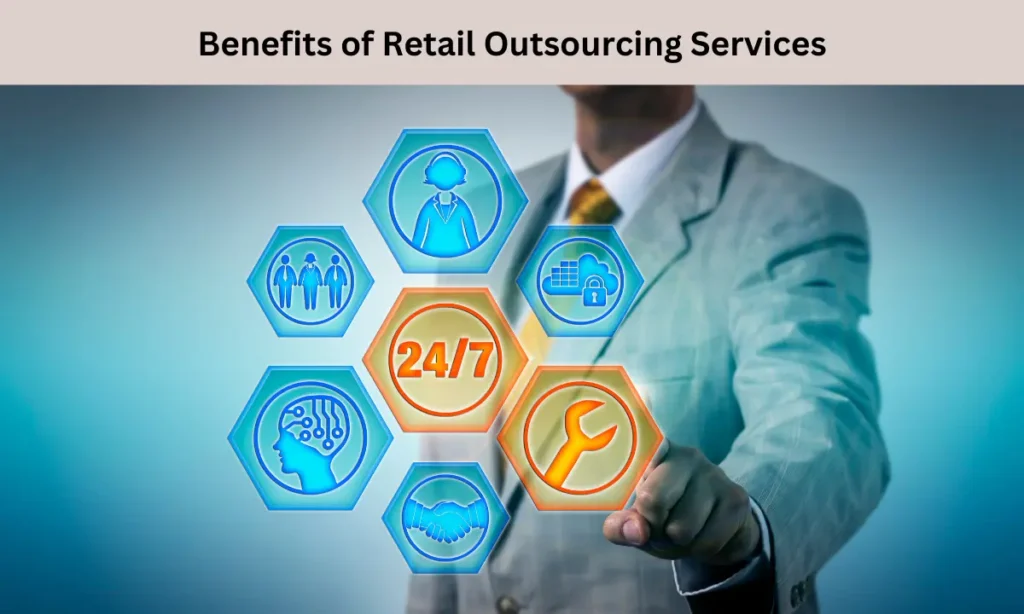Key Points:
1. Retail outsourcing helps reduce costs, improve focus on core business activities, and provide access to specialized expertise in areas like inventory management, customer support, and supply chain operations.
2. Benefits include economies of scale, flexibility to scale operations, and enhanced efficiency through technology and automation, while potential risks like loss of control and data security concerns should be addressed.
3. To choose the right outsourcing partner, evaluate experience, customer feedback, and budget considerations, ensuring clear communication and performance monitoring for long-term success.
4. Real-world examples like Walmart and Amazon highlight how outsourcing can streamline operations and support rapid business growth.
Retail outsourcing services involve retail companies outsourcing certain tasks or functions to external service providers. These tasks can encompass various areas such as customer support, supply chain management, and e-commerce operations.
The main benefits of this approach include cost savings, enabling retailers to focus on their core business activities, and gaining access to specialized expertise. Nevertheless, it’s important to acknowledge and address challenges like potential loss of control and data security concerns in order to ensure a successful outsourcing partnership.
Importance of outsourcing in the retail industry
1. Cuts Costs: Reduces operational expenses.
2. Focuses on Core: Lets retailers concentrate on core activities.
3. Scales Easily: Adapts to market changes.
4. Accesses Expertise: Taps into specialized knowledge.
5. Mitigates Risks: Shares responsibilities.
6. Enhances Customer Satisfaction: Improves service quality.
7. Saves Time: Increases efficiency.
8. Embraces Technology: Stays competitive.
9. Gains Competitive Advantage: Stands out in the market Importance of outsourcing in the retail industry.
The Scope of this Blog
The blog’s purpose is to talk about outsourcing in retail in an easy-to-understand way. It will cover topics like why outsourcing can be good or challenging, what parts of retail can be outsourced, how it affects costs and customer happiness, and why it’s important for retail businesses to stay competitive and flexible. We’ll also share real stories and tips from the world of retail outsourcing to help both retailers and service providers in this industry.
Benefits of Retail Outsourcing Services

Cost- Saving advantages
1. Economies of Scale: Outsourcing allows companies to benefit from economies of scale, resulting in cost savings per unit of service or production.
2. Lower Labor Costs: Outsourcing to regions with lower labor costs can reduce overall expenses for companies.
3. Infrastructure Savings: Outsourcing eliminates the need for significant infrastructure investments, as service providers often have their own facilities and equipment.
4. Training Cost Reduction: Companies can avoid the expenses associated with training employees by outsourcing, as service providers typically have well-trained staff.
5. Overhead Avoidance: Outsourcing reduces overhead costs related to managing in-house teams, including expenses like office space and utilities.
Improved Focus on core Buisness activities
Enhancing the focus on core business activities is a pivotal advantage of outsourcing. This strategic approach empowers companies to reallocate their resources and efforts toward their primary strengths and essential functions. By delegating non-core tasks to external service providers, businesses can streamline their operations, boost efficiency, and gain a competitive edge.
This renewed concentration frequently results in heightened innovation, improved customer satisfaction, and overall business expansion, as it allows organizations to prioritize their core competencies while entrusting other responsibilities to specialized experts.
Access to specialized expertise
Access to specialized expertise is a valuable benefit of outsourcing. It involves leveraging the knowledge and skills of external specialists in specific fields. This not only provides cost-effective solutions and time savings but also enhances quality and fosters innovation. Moreover, it enables companies to concentrate on their core strengths and adapt to changing needs while accessing global talent without geographical constraints
Scalability and flexibility
Scalability and flexibility in the context of outsourcing entail the capability to adjust and modify the extent and scale of operations as required. This adaptability allows for expansion during peak periods and contraction during less active times.
Types of Retail outsourcing services
Inventory Management
Inventory operation is like maintaining a delicate balance – insuring there is enough product to meet client demand without having too important that it becomes expensive or takes up too important space.
Customer support and Services
Customer support and service involve assisting and satisfying guests throughout their buying trip, from answering their questions to resolving issues and icing a positive experience.
E-commerce website development
E-commerce website development is the process of casting online platforms for businesses to vend their products or services. It entails designing websites that smooth online deals, expanding call reach and accessibility.
Supply Chain Management
Supply chain management is about moving products efficiently from suppliers to customers, focusing on cost savings and quality.
How to Choose the Right Retail Outsourcing Partner

Accessing your retail business
It involves recognizing what your store requires to operate effectively, such as managing inventory and implementing technology for enhancements.
Evaluating outsourcing provider Experience
Assessing the outsourcing provider’s experience” involves examining their track record and expertise to ensure they are capable of effectively handling your outsourced tasks.
Checking references and customer testimonials
It means reaching once guests and reading their feedback to estimate the service provider’s trustability and quality.
Cost considerations and budgeting
It involve the careful examination of expenses and the creation of a financial plan to ensure that a project or operation stays within its designated budget. This process includes evaluating the costs associated with various project aspects and efficiently managing resources to avoid exceeding the established budget limits.
Case studies
Success stories of retail business that Benefitted from outsourcing
Walmart: By outsourcing transportation and logistics functions, Walmart has enhanced efficiency and reduced costs while maintaining its commitment to low prices.
Amazon: Amazon uses outsourcing for customer service and fulfillment centers, allowing them to provide 24/7 support and scale their e-commerce business rapidly.
Specific challenges they faced and how outsourcing helped them
Walmart:
Challenge: Complex supply chain management.
Outsourcing Solution: Hired logistics experts.
Result: Streamlined supply chain, reduced costs.
Amazon:
Challenge: Rapid business growth.
Outsourcing Solution: Third-party customer service and fulfillment centers.
Result: Efficient scaling, uninterrupted customer support, and continued growth
Challenges and Risks
Loss of Control: Retailers may have limited control over outsourced tasks.
Data Security: Sharing sensitive data can pose security risks.
Quality Variations: Service quality may vary with outsourcing.
Communication Challenges: Time zones and language barriers can hinder communication.
Hidden Costs: There may be unexpected expenses in outsourcing.
Strategies for mitigating these risks
Due Diligence: Thoroughly research and choose outsourcing partners with a strong track record.
Clear Contracts: Create detailed contracts outlining expectations and quality standards.
Data Security: Implement robust data security measures and compliance.
Quality Monitoring: Continuously monitor and ensure service quality.
Effective Communication: Establish clear communication channels for transparency.
Trends in Retail Outsourcing Services
Current trends shaping the retail outsourcing landscape
E-commerce Fulfillment Outsourcing logistics for online retail.
Data Analytics and AI Outsourcing for data- driven decision- timber.
Client Support Tech Outsourcing for chatbots and virtual sidekicks.
force Chain Optimization Outsourcing to streamline operations.
Global Expansion Outsourcing for transnational request entry.
Insights on technology advancements, globalization, and market dynamicsrent trends shaping the retail outsourcing landscape
1. Technology Advancements: Retailers outsource for data analytics and AI, and automation in e-commerce logistics.
2. Globalization: Outsourcing helps retailers expand globally and meet sustainability standards across supply chains.
3. Market Dynamics: Outsourcing addresses changing consumer expectations and competitive pressures by reducing costs and optimizing operations.
Tips for effective Retail Outsourcing
Actionable tips for businesses considering outsourcing
Set Clear Goals: Define specific objectives for outsourcing, like cost reduction or skill access.
Research Partners: Thoroughly research and assess potential outsourcing providers.
Focus on Non-Core Tasks: Outsource non-core functions that don’t define your competitive edge.
Detailed Contracts: Create comprehensive contracts outlining expectations and quality standards.
Start Small: Begin with a pilot project before scaling up outsourcing efforts.
Communication Strategies
1. Clear Communication Channels: Set up transparent communication methods.
2. Defined Protocols: Clearly outline roles, responsibilities, and protocols in contracts.
3. Cultural Sensitivity: Promote understanding in international collaborations, considering cultural differences.
Monitoring Performance
4. KPIs: Establish measurable Key Performance Indicators (KPIs) for ongoing evaluation.
5. Quality Control: Implement regular quality assessments and feedback mechanisms.
6. Performance Reviews: Conduct structured reviews to assess progress.
Maintaining a Strong Partnership
7. Open Communication: Encourage open and honest communication.
8. Flexibility: Be adaptable to changes in the outsourcing arrangement.
9. Conflict Resolution: Define conflict resolution procedures in case of disputes.
10. Incentives: Consider performance incentives to motivate the outsourcing partner.
Measuring ROI
- Calculate costs and expenses.
- Determine financial benefits.
- Subtract costs from benefits for net gain.
- Use the formula: ROI = (Net Gain / Total Costs) x 100.
- Evaluate ROI against expectations.
- Consider intangible benefits.
- Adjust and monitor for ongoing optimization.
key performance indicators (KPIs) and metrics to track.
Cost Savings: Measure cost reduction percentage.
Calculate operational cost per unit.
Operational Efficiency: Track order processing time.
Assess inventory turnover.
Customer Satisfaction: Monitor customer feedback.
Evaluate Net Promoter Score (NPS).
Service Quality: Check accuracy and error rate.
Ensure compliance with Service Level Agreements (SLAs).
Revenue and Profitability: Analyze revenue growth.
Examine profit margins.
Blog Summary
Retail Outsourcing involves delegating tasks to external providers, offering cost savings and expertise. There are a few important things to be taken into consideration in retail outsourcing which Includes cost reduction, scalability, and focusing on core strengths. This blog has widely covered all aspects of retail outsourcing services along with an in-depth analysis of benefits, challenges, service types, and real stories for both retailers and providers.
Also read:




